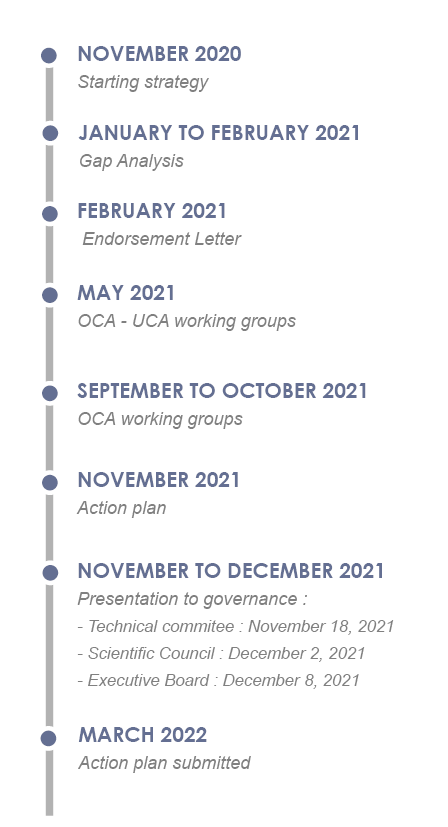|
CALENDAR
|
||||
|
CONTACT hrs4r@oca.eu |
||||

Observatoire de la Côte d’Azur, in a dynamic of continuous improvement of its practices and working conditions, is committed to implementing the European Human Resources Strategy for researchers: HRS4R.
This European strategy aims to improve the practices of research institutions, particularly as regards the recruitment and working conditions of researchers. The European Commission grants the "HR Excellence in Research" award to the institutions committed to this process.
Observatoire de la Côte d’Azur is seeking to obtain the award as part of its quality improvement process because it considers that the award can be a major asset for the university and its community of researchers and for all those involved in research and in research support.
This label will allow us to
- Implement an exemplary HR policy in search of constant improvement of working conditions
- Develop the careers of our researchers
- Give them the opportunity to contribute to the institutional policy
- Strengthen the university's international visibility
- Increase its attractiveness in terms of recruitment
- Obtain more funding by meeting the requirements of the European Commission
The HRS4R : main principles
The HRS4R Excellence in Research Award recognizes institutions that comply with the European Charter for Researchers and the Code of Conduct for the Recruitment of Researchers published in 2005 (https://euraxess.ec.europa.eu/jobs/charter). The initiative was designed to make the European Research Area more attractive in terms of recruitment and working conditions for researchers worldwide.
The Charter and the Code are based on 40 principles grouped into 4 main themes:
- Ethical principles and professional responsabilities
- Recruitement and mobility
- Working and safety conditions, professional environment
- Training and career development.
The main stages in obtaining the label
The endorsement letter is the starting point of our commitment to the HRS4R process. Once this letter has been sent to the European Commission, we have 12 months to submit an application for the HRS4R award.
> Application file
The label application file includes, (1) a presentation of the institution, (2) the gap analysis of our practices with respect to the 40 principles of the European Charter for Researcher, (3) our action plan, (4) our strategy for preparing and steering the action plan.
> Gap Analysis
This is an analysis of actions currently implemented in our institution in connection with the 40 principles of the European Charter for Researchers.
> Action plan
The action plan lists the measures we are committed to implement, the objectives to be achieved, the indicators used to follow-up and assess progress ant the implementation schedule. This action plan will be published before implementation.
> Evaluation by a commitee of European Community experts
The application is reviewed by a committee of European Community experts.
When will we obtain the label ?
Strategy
Our strategy is based on three main tenets: a strong political support, an ambitious communication plan (the communication department is associated with each step of the project), a broad consultation of all stakeholders in research (Through a survey and a call for candidates to be HRS4R officers and join the working groups).
Sucess factors of the HRS4R approach
The labelling process only makes sense if it corresponds to us, if it involves researchers at all stages, if it is conceived and developed progressively and finally if it is understandable and totally transparent.
A coordinated approach
The labelling process is coordinated with Université Côte d'Azur. The HRS4R label has already been obtained by partners of the Observatoire de la Côte d'Azur (CNRS). Some of the key actions decided in the OCA’s action plan will be coordinated with Université Côte d'Azur and the CNRS as part of the site policy and to strengthen the excellence of research actors.
Project steering
We have set up three large teams to steer this extensive project :
- The strategic steering committee approves the gap analysis and the project team's proposal. It arbitrates the actions listed by the Observatoire de la Côte d’Azur in its action plan and approves the award application
Denis Mourard / Stéphane Mazevet, OCA's director
Nelson Christensen, UMR Artemis's director
Marc Sosson, UMR Géoazur's director
Philippe Stee, UMR Lagrange's director
Sophie Rouzière, Secretary General, project team
- The project team manages the project in contact with the working groups (carriers out the gap analysis, defines the action plan, drafts the application, gets stakeholders involved and obtains approval from governance).
Sophie Rouzière, Secretary General, coordination & link with UCA project team
Muriel Billerey-Blanchard, General Administration assistant & link with UCA project team
Marc Fulconis, communication manager
Karine Moutou, human resources manager
- The working groups are tasked with analysing the results of the gap analysis and suggesting actions to be implemented.



